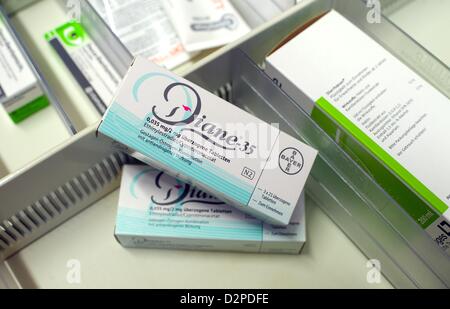
In a statement, the company said the educational tool it is developing to help doctors in "responsible prescribing and appropriate use of the product" will be available by the end of this year.ĭrug researcher Barbara Mintzes, who has been keeping close watch on Diane-35's use in Canada for nearly a decade, is skeptical about the new education campaign. "I think that's smart."īayer told the Star it has been "working closely with Health Canada over the past month regarding additional ways to remind health care professionals about the appropriate use of Diane-35." "I guess they're putting the onus back on the doctors to explain to people what they're taking and what the risks are," he said.

Marit's father Bruce McKenzie said he's happy the government is doing something to increase awareness about Diane-35. "When health care professionals prescribe any health product, the benefit must always be considered against the possible risks to that patient." Ottawa's role "does not include decision-making on the choice and administration of a health product to an individual patient," a department spokesman said. Nearly 500,000 prescriptions were written last year in Canada for Diane-35 and its two generics - Cyestra-35 and Novo-Cyproterone/Ethinyl Estradiol - according to data from IMS Brogan, a firm that collects and analyses health care information.Īlthough Health Canada decides what drugs get on the market, it has little say in how they are used. The department said it is in the process of preparing to release the information. The federal health minister vowed to make these reports public after the Star exposed the policy. Ottawa said it and hundreds of other post-market safety assessments of drugs contained "classified business information." Health Canada's review of the drug has been kept secret. Safety reviews completed in May by both Health Canada and its counterpart, The European Medicines Agency, found the drug's benefits "continue to outweigh the risks when used as authorized for the temporary treatment of severe acne in women who are unresponsive to other available treatments." Marit is the 13th woman since 2000 whose death has been unofficially linked to Diane-35, according to a federal database of adverse drug reactions.

Dubravka Rakic said she had not seen Health Canada's advisories warning the drug should be used only as a short-term treatment for severe acne and that it carries an elevated clotting risk. Her doctor told the Star she knows that certain types of hormone-based drugs like Diane-35 can cause clotting but didn't connect the dots when Marit complained of extreme fatigue and a racing heart the week before her death.

A hospital pharmacist suspected Diane-35, which she had been taking for almost a year though her complexion was nearly flawless. The move comes after the Toronto Star highlighted the case of Marit McKenzie, an 18-year-old, first-year university student from Calgary who died suddenly in January of a catastrophic blood clot. Health Minister Rona Ambrose said health-care professionals will receive "guidance material," including a checklist for prescribing Diane-35, which will be vetted by the federal department and doctors associations. The pill is approved for use only as a "last-resort medication" for severe acne but Health Canada said many doctors have failed to heed several advisories warning against its use as a contraceptive. to fund an "education" campaign to deter doctors from prescribing Diane-35 as birth control, the federal health minister announced on Wednesday. Ottawa has taken the unusual step of asking Bayer Inc. Health Canada is cracking down on off-label drug use, starting with a controversial acne pill.


 0 kommentar(er)
0 kommentar(er)
